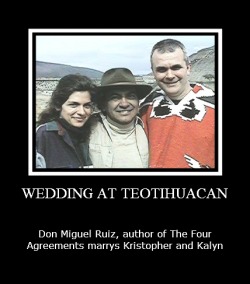What is the Fifth Agreement in don Miguel Ruiz's New Book?

When working with his apprentices don Miguel would often declare, "Don't believe me, don't believe others, don't believe yourself." He currently calls this The Fifth Agreement.
Before we speak about what this powerful tool called The Fifth Agreement is, let's talk a little bit about don Miguel.
Don Miguel is a nagual (master) in the Toltec lineage. Who are Toltecs? Thousands of years ago, the Toltec had the reputation throughout southern Mexico as women and men of knowledge. Anthropologists have spoken of the Toltec as a nation or a race. But the Toltec were scientists and artists who formed a society to explore and protect the spiritual knowledge and practices of the ancient ones. It may seem strange that they combined the secular with the sacred, but the Toltec considered science and spirit to be the same since all energy, whether material or ethereal, is derived from the same source and governed by the same universal laws.
Eliminating belief systems are one of the core teachings of the Toltec Path. Whenever you have a belief, you no longer perceive what is. You see only what Toltecs call, the smoky mirror. You see the world through colored glasses. For example, in Japan they have the number four symbolizes death. The word 'shi', which means four in Japanese sounds like the word death, 'shinu' in Japanese. Because of this belief, they get rid of the fourth floor in their buildings. Likewise, the number 13 is often considered unlucky in western cultures, and the 13th floor is sometimes eliminated from buildings. Depending on their beliefs, each culture understands things differently.
To give an example, in the west, suicide is thought to have dire consequences in the afterlife. This is due to the commonness of Christian beliefs about heaven and hell. In Japan, on the other hand, the Samurai considered suicide as honorable. If defeated, a warrior considered it an honor to be able to commit suicide. To this day, suicide is perceived very differently in Japan than it is in the West.
Why is this significant on a spiritual path? It is important because in order to see the truth, to see reality plainly and impartial, one must be free of belief systems. In order to grow and evolve, one must change the way they see themselves and the world. Toltecs call belief systems inventory. In order to perceive reality and beyond into what Toltecs call the second attention, the world of energy, they strive to do away with all inventory. This is much like seeing the world through the eyes of a child, or what Buddhists call 'The Beginners Mind'.
It is easy to see how things like racial prejudice and discrimination are often based on belief systems. If one believes that a race of people are inferior, they will actually see things that validate their beliefs. They see the world through lenses colored by their beliefs.
One of Don Miguel Ruiz's dreams is to transform the world to a better place. To do so we must first transform our personal dreams. We must become clear, free from old knowledge and beliefs that bind us. This is the power of the Fifth Agreement.
